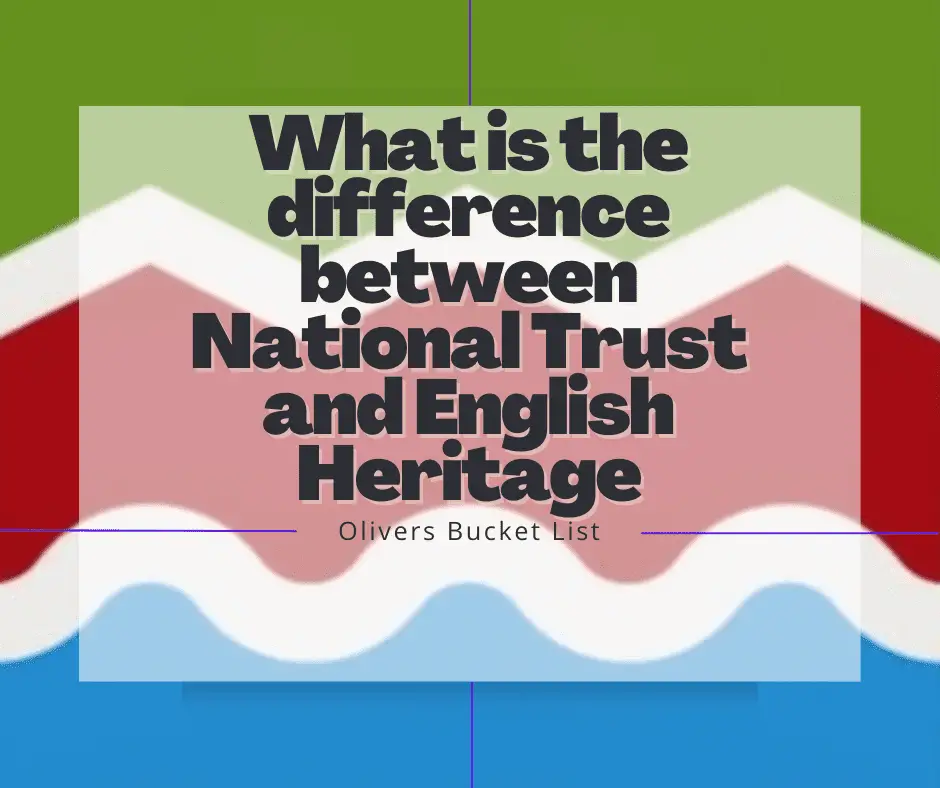Is this blog post I am going to go over what is the difference between National Trust and English Heritage. While I am currently on my journey to complete my two bucket lists to visit all the properties of the National Trust and English Heritage I am a member of both organisations. However I thought that it would be a good to go over the differences between the two of them if you only wanted to join the one.
Who they are
The National Trust and English Heritage is very similar to each other both in what they do and their size. They both have the aim of preserving history and the places of history, so that people alive now and those in the future are able to visit and experience and enjoy them.
The National Trust is a charity based in the United Kingdom. It was founded way back in 1895 by by three people. Octavia Hill, Sir Robert Hunter and Canon Hardwicke Rawnsley. It mainly got it properties from bequeathments from members of the public. It also does charge entrance fee to it most of its properties. Or you can visit for free if you pay for a yearly membership with them.
Compared to the National Trust, English Heritage is relatively young. It was created by the United Kingdom government in 2015 when the government rearranged some of its departments. English heritage was split off from the government to act interdependently to look after and manage the properties that the government owns. It is now run in a very similar way to the National Trust with entrance fees, yearly memberships ect.
Properties
Both the National Trust and English Heritage have a vast collection of property/estates that that own, manage, care for and provide access too. They do slightly differ in the overall mix of their properties. The National Trust has a greater amount of land and coastline compared with what English Heritage. Whereas English Heritage has more of the ancient and historical places in the United Kingdom.
In my bucket lists I have 427 properties for the National Trust to visit and 392 properties for English Heritage to visit. So you can see there is only around a 10% between the two of the total places that they own.
There are a few special cases where both the National Trust and English Heritage share the property. Stonehenge is one of the main ones of these. You are able to visit Stonehenge with a membership to either of the two.
Memberships
Both the National Trust and English Heritage have a membership scheme for many different circumstances. If that be a single adult or a family. The membership provides the member free entry to places. They are actually very similar to each other price wise, below is a chart comparing the memberships that they offer and their associated prices.
| Type of Membership | National Trust | English Heritage |
| Individual Membership | £76.80 | £66.00 |
| Senior | £59.00 | |
| Young | £38.40 | £53.00 |
| Joint Adult | £127.20 | £115.00 |
| Family two adults | £133.80 | £115.00 |
| Lifetime Adult | £1845.00 | £1580.00 |
As you can see from the above table the National Trust is slightly more expensive for every membership type that you choose from. There are a couple of differences such as the National Trust doesn’t offer a senior membership. Also English Heritage members are able to get a few children in for free with there memberships.
Partnerships
Both the National Trust and English Heritage have partnership agreements with companies and other attractions in the United Kingdom whereby members get some sort of discount. English Heritage really pulls ahead of the National Trust here as they have many more partnerships compared to the National Trust. I go over some of the partnerships that the National Trust membership gives here. Below is a selection of the partnerships you would get with a English Heritage membership.
- Cutty Sark
- Blenheim Palace
- Bletchley Park
- Canterbury Cathedral
- King Richard III Visitor Centre
- British Motor Museum
- Warwick Castle
This is just a few the list is surprisingly large for English Heritage Members.
Useful Links
National Trust – Link
English Heritage – Link

